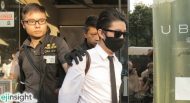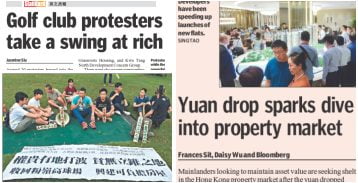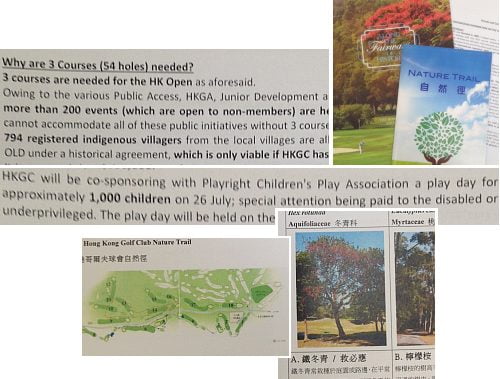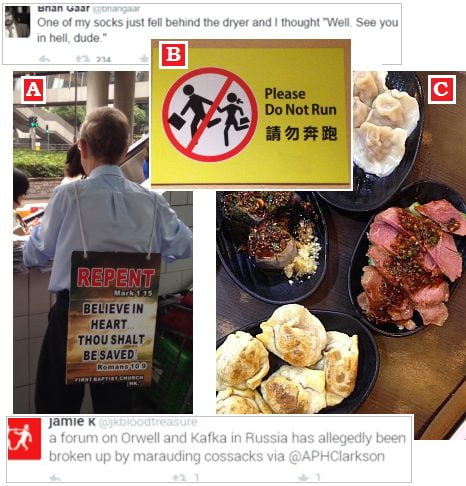Although Hong Kong is not alone in giving Uber a rocky ride, it’s not doing much for the city’s tech-friendly, up-to-speed, ‘freest economy’, start-up-hub-zone-incubator reputation to be  putting the company’s office staff in cuffs and, reportedly, demanding HK$200,000 bail. Nor is it helping the HK Police’s local image as clumsy and heavy-handed when faced with anything vaguely young, hip and trendy, and selective in enforcement (compare with inaction against daily taxi-driver infringements and private cars’ illegal parking).
putting the company’s office staff in cuffs and, reportedly, demanding HK$200,000 bail. Nor is it helping the HK Police’s local image as clumsy and heavy-handed when faced with anything vaguely young, hip and trendy, and selective in enforcement (compare with inaction against daily taxi-driver infringements and private cars’ illegal parking).
There is a genuine regulatory issue to do with licensing and insurance. There is also a large civil service with the administrative skills and powers to overcome such problems. The fact that the government is treating Uber as some sort of threat suggests that facilitating economic activities to serve consumers’ interests is not its priority here. What is?
Officials are supposedly fearful of taxi drivers, who in theory have the ability to bring Hong Kong to a halt and possibly trigger unrest. It has happened before, a long time ago. Even if the idea of ‘taxi riots’ is far-fetched these days, you can understand our valiant leaders being nervous about some sort of Cabbies-go-Umbrella road blocks.
The taxi industry is also an influential part of the Transport functional constituency, which like most trade-based functional constituencies is part of a legislative voting bloc that can be controlled by Beijing. Traditionally, the Transport constituency has thrown its weight around; when Miriam Lau was its representative, it fought against things like cleaner vehicle engines and tougher penalties for running red lights. It is a policy of the national as well as local government to place such a group’s interests above those of the wider Hong Kong populace (in case you hadn’t noticed).
Last, several thousand speculators are sitting on taxi licences, which are tradable and fetch HK$7 million or something – quite a lot for a bit of paper. As with a mortgage for a property, you can get a loan to buy one and then rent it out to drivers, thus achieving the Hong Kong dream of doing no productive work while raking in quick quick easy sure fast money and watching your asset rise up up up in value for all eternity. Faced with a choice between protecting the interests of such (if rather low-bred) investors and looking after the well-being of the public, officials will instinctively favour the former. (Same as with landlords: both have invested in something on the assumption that the government will keep it artificially scarce).
But, after all the blather about innovation and tech, the administration is exposing itself to a good skewering here.
On a similar note, Demonstration of the Week Award must go to the small but brilliant group who occupied part of Fanling golf course, calling for the land to be used for homes.
The HK Golf Club knows that it, too, is exposed to a massive skewering on this. Earlier this year, it produced glossy brochures on its Fanling estate’s historical importance, plus waffle about its ‘nature trails’, and a backgrounder with stomach-churning puke about how it helps the disabled and indigenous villagers…
Could ‘Occupy Golf Club’ become as popular as the anti-shopper gatherings in Sheung Shui have been? It would be a nice day out. Great picnic spot! (The Standard also reports that a weaker Yuan is attracting more Mainlanders to buy property here. That’s what a strong Yuan did, too. Most strange.)
To put housing issues in perspective, there’s Tianjin, where even Xinhua admits 112 are dead and 95 missing from the explosion. The visuals – still shocking after four days – and stories about cyanide make you wonder… How long it will be before a big area (a mile across?) of urban residential/commercial space can be made fit for human habitation again? Six months? One year? Several years? Assuming you can convince people to live and work there.
The weekend in pictures…
A Trying to drown out nearby didgeridoo player (not shown), really loud street preacher screaming at passengers going up escalator (all too slowly) in Central.
B ‘Every child an obese child – Discovery Bay’s aim’.
C Northern Dumpling Yuan in Western: steamed dumplings, eggplant, fried dumplings and what the menu called ‘spicy donkey’ but, grrrr, was actually beef – have informed Consumer Council.




If Vagina Yip can tell us to go to Shenzhen to ride a bike then maybe she can also tell the golf playing toadies to go and swing a club at Mission Hills. Holding my breath….
Uber has artificially lowered prices, but it can’t last. In Kuala Lumpur, for HK$7 you get a clean, newish, polite, multilingual, punctual, map-supported, speedy ride, thanks to a policy of subsidising short trips.
Uber is two parties engaging voluntarily (“caveat emptor”) in an unregulated commercial transaction. That’s bound to drive gubmint crazy.
Uber has as a business model to insert itself as a middle man and reap handsome profits for it. The profits of course come from the drivers as they will have to bear the cost of being basically a slave laborer to the Uber smartphone app. While competition is nice to have in transport, lowering social standards and skimming money off the top, and all of that in blatant breach of regulations, is not entrepreneurial spirit. The army of lawyers employed by Uber’s quasi-autistic CEO and its 16 bn USD valuation all point out that the valley knows where the money can be stolen from since the banks have run out of easy scams.
Timer – I believe Uber is valued at 50 bn USD. The number that really blows my mind is the more than 110 bn HKD combined value of all the local taxi licenses.
If Uber is successful at building a truly international system, then its current value, at only ca. 3.5x the HK market’s value, is a bargain. However, I am a sceptical of a company that has a business model based on operating illegally in most jurisdictions it operates in with the hope that it can get the laws changed in the future.
Timer- How is standing outside in the rain for an hour waiting for a taxi for the pleasure of putting your hand into a door handle stuffed with used tissue paper a high social standard? And riding at 110 kph in a car designed with 50 year old safety standards? How is a company “skimming off the top” different than any other successful business model? Is the point of a service industry to provide a competitive service for the consumer or to provide a communist meal ticket for an uncompetitive labourer with the right connections to get a job? And have you noticed the taxi drivers are already “slaves” to as many as 10 phones and apps already, as they themselves try to skirt the rules in a clumsy attempt to achieve the same aim as Uber?
Timer is probably a paid shill for the taxi cartel
If HK taxi driver’s had one bit of initiative then they would take on Uber with their own app much like the ‘my teksi’ one in Malaysia. Noting PD’s comment about KL taxis, this is the only reliable way of hailing a cab there.
The fact that there are problems with the domestic taxi system, which are too numerous to go into here and deserve a lengthy discussion themselves, does not excuse Uber from complying with local legislation. Do you really want to ride in an Uber car which has no valid insurance? This is a basic problem with the Uber model and I agree with PHT.
Perhaps we should be commenting more on the lack of a local app which the taxi drivers would find attractive. Why is this so when we are, in the Government’s view, a technology hub and hotbed of innovation? As MGE points out, the taxi drivers are doing their best with what they have and would surely welcome a suitable app.
C.Law: if you hitch a ride in your neighbor’s Nissan, you also have no insurance.
Something else: How about an app that links car owners directly with people with people who need a ride ? ( a bit like GoGoVan )
You can try HKTaxi which is in Chinese only, but it works reasonably well. At peak times you can add a small tip which usually snags you a ride and ends up not costing more than Uber.
@Diane Butler – I don’t think that’s correct. Every driver’s insurance should cover non-paying passengers such as family and friends – unless they’re driving.
Diane Butler, you are 100% wrong. The minimum legal requirement for motor insurance is 3rd party risks, which is what you are when you ride in your friend’s car.
The problem for Uber is that they take paying passengers which is specifically excluded form the standard insurance policy and immediately invalidates it, hence the arrests for driving without insurance. Driving without insurance is one of the most serious offences under the Road Traffic Ord. precisely because of the consequences to third parties involved in accidents who would receive no compensation for injuries or damage.